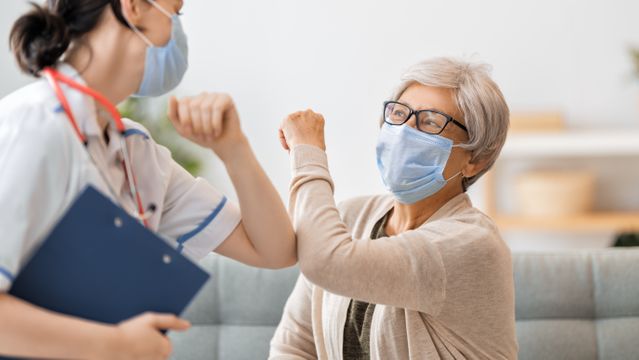How Family Nurse Practitioners Can Help Battle COVID-19 Through Patient Education

Family nurse practitioners (FNPs) have a multifaceted role as healthcare providers and educators. Especially during uncertain times, family nurse practitioners can use patient education to improve awareness and treatment effectiveness.
- What Is the Role of the Family Nurse Practitioner?
- How Important Is Patient Education?
- What Is the Status of COVID-19?
- Who is High Risk?
- How Can Family Nurse Practitioners Use Education to Protect Patients from COVID-19?
- Educating Elderly Patients
- Educating Individuals and Families
- Wilkes University: Advocates for Education
This article will touch on the role of family nurse practitioners and the value of patient education amidst the recent coronavirus (COVID-19) climate.

What Is the Role of the Family Nurse Practitioner?
FNPs are nurse practitioners (NPs) with a concentration in family practice. They provide comprehensive health services to patients of all ages.
Their day-to-day duties include:
- Evaluating medical conditions
- Educating patients on disease prevention
- Treating conditions that fall under primary care
- Promoting health through treatment and lifestyle changes
Most family nurse practitioners specialize in primary care. As a result, they are in high demand.
By 2032, the Association of American Medical Colleges expects the nation to have a deficit of between 21,100 and 55,200 primary care doctors.
The shortage is due partly to the growing population of older adults. The Census Bureau projects that adults ages 65 and older will outnumber children and adults by 2034, tipping the patient population scale.

How Important Is Patient Education?
Patient education is an essential NP responsibility. In one survey, nearly 9 in 10 NPs said they spend at least half of their time educating patients about care.
The Journal for Nurse Practitioners explains the NP approach to care, “NPs take time because they practice nursing, which is more than identifying a problem and suggesting a solution; it is a quest to work collaboratively with patients, families, and others toward patient-centered goals.”
Opening the door for collaboration gives NPs the ability to inspire change.
Patient education has been shown to increase engagement and compliance while promoting positive health outcomes. In fact, patients of NPs have reported higher satisfaction than those of physicians.
The public health impact of patient education increases as NPs consider factors such as patient health literacy (i.e. the ability to understand health information), as well as personal attitudes and beliefs.
These factors can be addressed through meaningful conversations with patients.
Their focus on health promotion, disease prevention, and health education and counseling sets NPs apart from other healthcare providers.
Family nurse practitioners, in particular, are capable of educating the largest group of individuals (i.e. ages 0 and up). In turn, FNPs are poised to use patient education as a means to empower individuals and communities at large.

What Is the Status of COVID-19?
Health officials have identified COVID-19 cases in almost every country.
In the U.S., all 50 states and the District of Columbia have confirmed outbreaks. For the most up-to-date information, check the CDC COVID Data Tracker.
Much is still being learned about COVID-19, but reports show that symptoms can range from mild to severe and appear two to 14 days after exposure.
Common symptoms include fever, cough, and shortness of breath. Some individuals may experience no symptoms but are still infected and contagious.
The asymptomatic spread of COVID-19 is a widespread concern, putting vulnerable populations especially at risk.
Who is High Risk?
Every person is susceptible to COVID-19, but some individuals have an increased risk.
High-risk populations include those who have underlying or chronic medical conditions (e.g. heart disease, diabetes, and lung disease), in addition to those aged 65 or older.
One in every seven Americans are elderly, and approximately 80% have at least one chronic disease.
Long-term care facilities are particularly at risk, accounting for nearly 10% of COVID-19 cases nationwide.
For this reason, U.S. health officials have emphasized the need to shield older adults from COVID-19.

How Can Family Nurse Practitioners Use Education to Protect Patients from COVID-19?
Family nurse practitioners are encouraged to follow guidelines set by the American Association of Nurse Practitioners (AANP) to combat the spread of COVID-19 during patient interaction.
On a larger scale, FNPs use patient education to combat miseducation and spread accurate knowledge throughout the community. Working with patients of all age groups, FNPs are uniquely poised to impact both high-risk and general populations.
Educating Elderly Patients
Until COVID-19 subsides, FNPs can proactively share information about the disease with older adults.
One key message is how elderly patients can reduce their risk of being exposed. The Centers for Disease Control and Prevention (CDC) recommends:
- Washing their hands frequently for at least 20 seconds
- Using a hand sanitizer that contains at least 60% alcohol if soap and water are not available
- Wearing a mask in public even if they don’t feel sick
- Avoiding touching their face
- Keeping away from others who are sick and limiting close contact in public
- Avoiding crowds
- Avoiding cruise travel and non-essential air travel
Because elderly patients must stay home as much as possible, FNPs may help them develop a plan for meeting their routine needs if needed. This means stocking up on supplies, household items, and extra medication, including prescriptions.
If possible, elderly patients should also identify a friend or family member who can provide support—many elderly live alone.
It’s also vital for FNPs to educate elderly patients about the symptoms of COVID-19. Patients should understand the signs and when to seek medical attention.
Patient education for elderly patients also involves:
- Correcting any misinformation about COVID-19
- Partnering with the patient’s support system (e.g., family or other providers)
- Connecting the patient to additional resources, if needed
- Helping the patient create an emergency care plan, in case they become ill
Educating Individuals and Families
The goal of educating individuals and families about COVID-19 is to help them protect themselves as well as high-risk groups.
Educating the public is especially important with asymptomatic transmission being a concern. For instance, a case in Maryland recently showed that over half of the staff at a long care facility were unknowingly infected with COVID-19.
Family nurse practitioners can help individuals understand that even healthy, symptom-free people can potentially carry the disease. FNPs can encourage the mindset of communal responsibility to help protect the elderly and at-risk.
During routine check-ups, FNPs can encourage patients to take measures to minimize the spread of COVID-19 by:
- Washing their hands frequently for at least 20 seconds
- Using a hand sanitizer that contains at least 60% alcohol if soap and water are not available
- Wearing a mask in public even if they don’t feel sick
- Staying at least six feet away from other people in public
- Limiting non-socially distant interactions with the elderly and at-risk family members
- Avoiding touching their face
- Covering their mouth and nose with a tissue, or upper sleeve, when coughing or sneezing
- Staying home when sick
- Self-quarantining if potentially exposed to COVID-19
Family nurse practitioners can also check with patients to see if they have concerns about elderly family members. It’s important to discuss areas of need and ways the patient can support older adults, while protecting themselves from the virus.
As FNPs lead discussions about COVID-19, it is not uncommon for them to help patients unlearn inaccurate information that may have been read online or heard from a friend.
When battling misinformation, a recent article sheds light on the significance of relationships, indicating that trust often outweighs facts. In turn, the rapport between a healthcare provider and patient has an impact on patient education.
Since FNPs provide care across the lifespan, they often develop trusted, long-term relationships with patients. This allows them to influence decision-making, which has an effect on public health—especially in the face of a pandemic.

Wilkes University: Advocates for Education
At Wilkes University, we understand the importance of educating FNPs to be the bridge between patient care and community care so that they can promote individual and public health through patient education, especially during COVID-19.
That’s why we offer flexible online classes, affordable tuition, and clinical placement services so our students can focus on their development.
Become a family nurse practitioner online at Wilkes through any of the following entrance points for the FNP concentration:
- Associate Degree in Nursing (RN) to Master of Science in Nursing (MSN) – Nurse Practitioner
- Master of Science in Nursing – Nurse Practitioner
- Post-Graduate/APRN Certificate
Learn why Wilkes is ranked among the best by The Princeton Review and how we’ve helped students tap their potential for over 80 years. We’re here to talk about everything Wilkes, everything nursing, and anything you need to make the right choice for your career.
What to read next?
- Wilkes’ DNP Student Shares Her Story
- What Does a Psychiatric Nurse Practitioner Do?
- Considering a Career as an Adult-Gerontology Nurse Practitioner in Primary Care?
- Is a Master of Science in Nursing (MSN) Right for You?
- Top 8 Benefits of an RN to MSN Online Program
- The Doctor of Nursing Practice (DNP) Degree: 7 Common FAQs Answered




